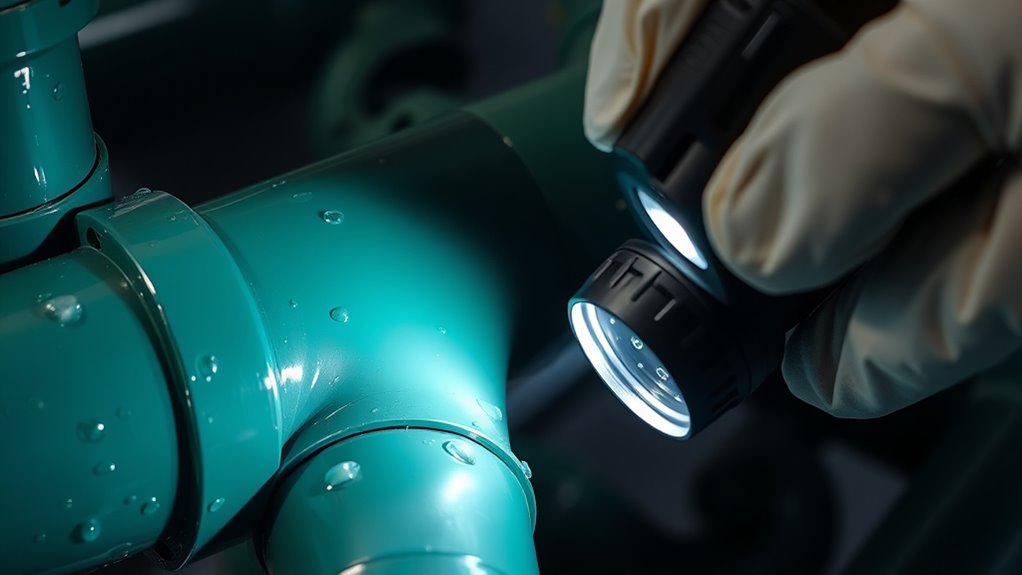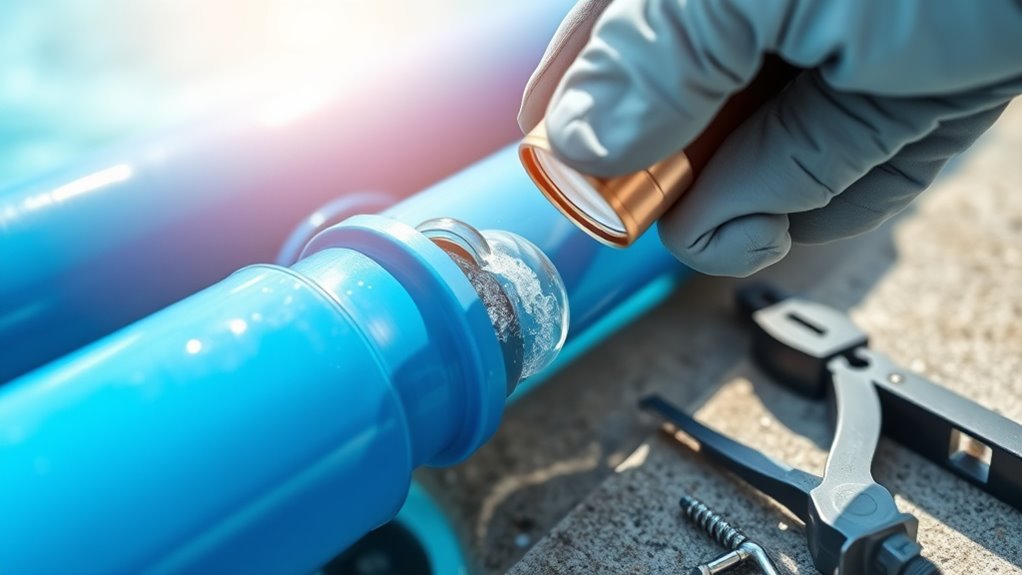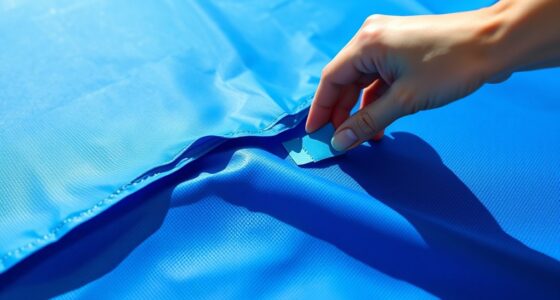To detect air leaks in your pool plumbing, start by inspecting visible connections, fittings, and the pump lid for cracks or damage, and listen for hissing sounds or bubbles during operation. Perform a soapy water test on suspect areas—bubbles indicate leaks. Tighten fittings and replace worn gaskets or O-rings as needed. For hidden leaks, professional detection tools may be required. Keep monitoring your system to prevent future issues—more tips are coming up.
Key Takeaways
- Inspect visible fittings, pump lid, and seals for cracks, damage, or looseness; perform soapy water tests to identify leaks.
- Listen for hissing sounds and observe bubbles near fittings or skimmer openings during pump operation.
- Tighten fittings and replace worn gaskets or o-rings to restore proper sealing and prevent air entry.
- Use professional leak detection tools for hidden or deep plumbing leaks beyond basic inspection.
- Regularly maintain and monitor your pool system to prevent leaks and ensure optimal pump performance.

Air leaks in pool plumbing can cause your pool to lose pressure, leading to inefficient operation and increased energy costs. When air infiltrates the system, your pump has to work harder to circulate water, which not only consumes more electricity but can also disturb the delicate balance of chemicals in your pool, especially chlorine levels. If you notice your chlorine isn’t maintaining proper levels or if your pool water seems murky despite regular chlorination, a hidden air leak might be the culprit. Addressing these leaks promptly can save you money and keep your pool safe and inviting.
One of the first signs of an air leak is a drop in pressure on your pump’s pressure gauge or a noticeable decrease in water flow. You might hear a hissing sound near the pump or see bubbles escaping from fittings or skimmer openings when the pump is running. To pinpoint the leak, start by inspecting visible connections, fittings, and the pump lid. Turn off the pump, then check for cracks, loose fittings, or damaged seals. If everything appears intact, consider performing a soapy water test: apply soapy water to suspect areas and observe for bubbling, which indicates escaping air. This simple step helps you locate leaks that aren’t immediately obvious.
A drop in pressure or bubbles signals an air leak in pool plumbing.
Once you’ve identified the leak, fixing it involves tightening fittings, replacing damaged o-rings, or sealing cracked components. A common area for leaks is the pump lid gasket; replacing a worn gasket often restores proper pressure. For leaks in the skimmer or returns, ensure fittings are tight and seals are intact. If the leak is deeper within the plumbing lines, you might need to call a professional to perform more advanced repairs, such as leak detection tests using specialized equipment. Additionally, AI-driven security systems can help monitor your pool’s infrastructure for potential issues, ensuring leaks are detected early before they cause significant damage.
While focusing on fixing leaks, don’t forget about pump maintenance. Regularly cleaning your pump basket and checking for debris prevents unnecessary strain on the system, which can exacerbate leaks or cause other issues. Maintaining ideal chlorine levels also supports overall pool health; a properly functioning pump circulates chemicals evenly, preventing algae growth and ensuring sanitation. When your pump is operating efficiently, it reduces the risk of air entering the system and keeps your pool’s chemistry balanced.
Frequently Asked Questions
Can Air Leaks Cause Long-Term Damage to My Pool Pump?
Yes, air leaks can harm your pool pump in the long run. When your pump pulls in air, it works harder, which can reduce its lifespan and lead to costly repairs. Addressing leaks early helps maintain pool pump longevity and keeps maintenance costs down. Regularly inspecting your plumbing for leaks and fixing them promptly guarantees your pump runs efficiently and lasts longer, saving you money and hassle over time.
Is It Safe to Repair Pool Plumbing Leaks Myself?
Is it safe to repair pool plumbing leaks yourself? While DIY repairs might seem tempting, it’s important to know your limits. If you have experience, you can try fixing small leaks, but for complex issues or if you’re unsure, professional assistance offers safety and guarantees the job gets done right. Don’t risk causing further damage; sometimes, calling in a professional is the smarter choice for long-term peace of mind.
How Often Should I Check for Air Leaks in My Pool?
You should check for air leaks in your pool during regular pool maintenance, ideally once a month or when you notice the water level drops unexpectedly. Leak detection is vital to keep your pool running efficiently and prevent costly repairs. Regularly inspecting your plumbing, skimmers, and pump seals helps catch leaks early. Staying proactive ensures your pool stays in top shape and avoids unnecessary water loss and damage.
Do Air Leaks Affect the Chemical Balance of My Pool?
Did you know that even small air leaks can cause your pool to lose up to 10% of its water each week? Air leak effects do impact your pool chemical balance because they introduce excess air into the system, which can throw off pH levels and chlorine efficiency. This imbalance can lead to cloudy water and algae growth. So, fixing leaks helps maintain proper chemical balance and keeps your pool safe and clean.
What Tools Are Recommended for Fixing Pool Plumbing Leaks?
For fixing pool plumbing leaks, you need the right tools for effective leak detection and tool selection. A leak detection dye tester helps identify exact leak spots quickly, while a pressure gauge allows you to monitor system pressure. A pipe wrench and PVC primer are essential for making repairs. Don’t forget a waterproof sealant for sealing joints. These tools streamline your repair process and guarantee your pool stays sealed and functional.
Conclusion
By staying vigilant and regularly inspecting your pool plumbing, you can catch air leaks before they become a major headache. Think of leaks as tiny holes in your pool’s armor—letting precious water and energy slip away. Fixing them promptly keeps your pool running smoothly and saves you money. Remember, a well-maintained system is the backbone of a crystal-clear pool, ensuring you enjoy endless sunny days without the worry of sneaky leaks undermining your aquatic oasis.









